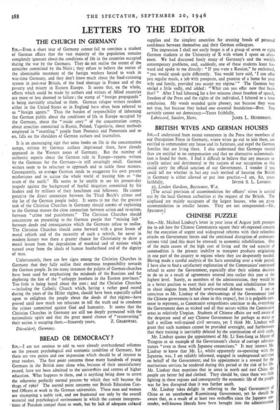LETTERS TO THE EDITOR
THE CHURCH IN GERMANY
Sm,—Even a short tour of Germany cannot fail to convince a student of German affairs that the vast majority of the population remains completely ignorant about-the conditions of life in the countries occupied 'during the war by the Germans. They do not realise the extent of the atrocities committed by the Nazis ; they refuse to believe the stories of the abominable treatment of the foreign workers forced to work in war-time Germany, and they don't know much about the food-rationing system in post-war Britain, of the food shortage in France and of the poverty and misery in Eastern Europe. It seems that, on the whole, efforts which could be made by authors and writers of Allied countries are more or less doomed to failure ; the stamp of " foreign propaganda " is being inevitably attached to them. German refugee writers resident either in the United States or in England have often been referred to as "foreign agents." Thus the burden of responsibility of informing the German public about the conditions of life in Europe occupied by the Germans, about the " inside story " of the concentration camps, about atrocities committed in Russia, Poland, Yugoslavia, about methods employed in " resettling " people from Posnania and Pomerania and so on, falls on the shoulders of German authors and journalists.
It is an encouraging sign that some books on life in the concentration camps, written by German authors imprisoned there, have already appeared in the Western zones of Germany. But the number of authentic reports about the German rule in Europe—reports written by the Germans for the Germans—is still amazingly small. German writers seem to be reluctant to approach and to tackle those matters. Consequently, an average German tends to exaggerate his own present misfortunes and to accuse the whole world of treating him as " the scum of the earth." He seems to be unable to see his present-day tragedy against the background of fearful iniquities committed by his leaders and by millions of their henchmen and followers. He cannot perceive the direct connexion between the Third Reich's crimes and the lot of the German people today. It seems to me that the greatest task of the Christian Churches in Germany should consist of explaining to the German masses the close connection between action and re-action, between " crime and punishment." The Christian Churches should concentrate on presenting to the German people that " missing link " between deeds and consequences which the Germans refuse to realise. The Christian Churches should come forward with a great lesson of moral rebirth and of the necessity of such a rebirth, for never in modern history was there a greater chance for Christianity to draw a moral lesson from the degradation of mankind and of nations which turned away from the ideals of human brotherhood and of the dignity of man.
Unfortunately, there are few signs among the Christian Churches in Germany that they fully realise their enormous responsibility towards the German people. In too many instances the pulpits of German churches have been used for emphasising the misdeeds of the Russians and -for deploring the fate of the " unhappy „brothers in the Eastern provinces." Too little is being heard about the past ; and the Christian Churches —including the Catholic Church which, having a rather good record during the years of the Hitler regime, should have been especially called upon to enlighten the people about the deeds of that regime—have proved until now much too reluctant to tell the truth and to condemn the crimes committed against God apd humanity. It seems that the Christian Churches in Germany are still too deeply permeated with the nationalistic spirit and that the great moral chance of "reconverting"
their nation is escaping them.—Sincerely yours, Z. GRABOWSKI.
Diisseldorf, Germany.


























 Previous page
Previous page